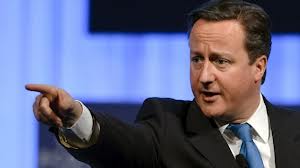 Top executives have warned U.K. Prime Minister David Cameron that he could damage Britain’s economy if he seeks to renegotiate the terms of its membership of the 27-country European Union.
Top executives have warned U.K. Prime Minister David Cameron that he could damage Britain’s economy if he seeks to renegotiate the terms of its membership of the 27-country European Union.
In a letter published in the Financial Times Wednesday, Virgin Group’s Richard Branson, London Stock Exchange head Chris Gibson-Smith, WPP chief executive Martin Sorrell and seven other business leaders challenged Cameron’s plan to renegotiate the U.K.’s membership terms of the 27-country EU and put the matter to a referendum.
The executives warn that such a plan could fail, pushing the U.K. out of the EU and hurting business in the process.
Membership of the EU has given the U.K. access to the massive European market as well as a say in how the region should govern itself and run its financial markets. The country has also benefited from EU funds to build infrastructure such as broadband networks.
However, popular distrust of the EU has grown in Britain _ one of the 10 countries in the region that doesn’t use the euro. The British public shows no interest in moving closer to the rest of Europe, and most can’t even seem to stomach the current control the EU, which many Britons see as meddlesome and inefficient.
Though the business leaders urged EU reform in their letter, they argued “we must be very careful not to call for a wholesale renegotiation of our EU membership, which would almost certainly be rejected.”
“To call for such a move in these circumstances would be to put our membership of the EU at risk and create damaging uncertainty for British business, which are the last things the prime minister would want to do,” they said.
Tough economic times are forcing the 17 EU countries that use the euro to move ever closer, creating a more powerful union that could leave non-euro members like Britain with less negotiating power.
But while Cameron wants Britain to remain in the EU and to retain influence in the body, he is also resisting a push by many member states, like France and Germany, to grant central authorities in Brussels greater powers over financial and legal affairs for the whole of the EU. In the long run, many EU countries want to turn the bloc into a United States of Europe, an idea British politicians, particularly among Cameron’s Conservatives, abhor.
Cameron is due to make a speech in mid-January to outline his position and the requests he will make. On Wednesday, he told lawmakers that Britain could get the changes it wanted.
“We’re active players in the European Union but there are changes we would like in our relationship that would be good for Britain and good for Europe and I think, because of the changes in eurozone which is driving a lot of change in the European Union, there’s every opportunity to achieve that settlement and seek consent for it,” he said.
ISJ

Leave a Reply
You must be logged in to post a comment.